| Cases presented at the conference |
PINFENON-S was solely administered (no combination with other drugs) to a group of 19 dogs with intractable diseases (hard to cure diseases), and an improvement rate of 73.6% was observed. |
Unlike cancer or heart disease, atopy and allergies are not usually life-threatening conditions, but they are commonly found illnesses and in the veterinary medicine field no established treatment method has been found to date. PINFENON-S was solely administered to dogs, and a sample of 6 cases is shown below.
To avoid any misunderstanding, please note, PINFENON does not guarantee a 100% cure; each case is different and depends upon the condition of the animal and its past medical history. As you will read in some cases the administration of PINFENON demonstrated very good results. |
1. △ 1 year-old male Pug. Atopy. Bleeding and swelling: No change |
2. ○ 15 year-old female Shiba. Atopy. Itching and scaling: Disappeared |
3. ○ 10 year-old female Labrador. Atopy. Itching: Disappeared |
4. △ 4 year-old female Shih Tzu. Atopy. Itching: No change |
5. △ 1 year-old female M. Dachshund. Atopy. Bleeding and swelling: No change |
6. ◎ 12 year-old male Shiba. Loss of tail hair (unknown cause): Hair regrowth |
■ Results
PINFENON was solely administered to 19 dogs with diseases. 18 dogs underwent platelet aggregometry and one dog did not. The following results were obtained: Complete remission: 6; Partial remission: 8; No change: 5; and Deterioration: 0.
Case No.6 (12 year-old Shiba) with no platelet aggregometry, visited a clinic on January 28, 2005, due to loss of hair at the tip and underside of the tail (unknown cause). Treatment of ointment and Reishi bracket fungus gave no improvement. From March 4, PINFENON-S was solely administered at a dose of 4 tablets twice daily, resulting in 90% to 100% of hair growing back in one month, and 70% recovery of hair length.
As comprehensive evaluation
Efficacy ratio = 73.6%
A high cure rate was confirmed.
* Particularly in the last case of the Shiba, primary treatment did not demonstrate any change, and the vet and owner were at a loss; however, by administration of PINFENON-S over the following month, virtually perfect new hair growth was observed as shown in the photographs; this is amazing!
| Before administration |
After administration of PINFENON-S alone |
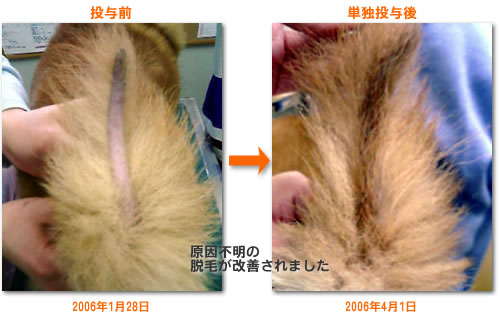 |
Loss of hair from unknown cause was improved |
January 28, 2006 |
April 1, 2006 |
|
|
| About the conference |
A presentation at the Annual Meeting of Japanese Society of Clinical Veterinary Medicine for two consecutive years: It is rare to present data on the administration of a supplement alone
The Japanese Society of Clinical Veterinary Medicine and Tottori Prefecture Animal Clinical Research Foundation hosted the 27th Annual Meeting of Japanese Society of Clinical Veterinary Medicine at the Osaka International Convention Center from November 17th to 19th, 2006.
At the general lectures on 19th, Prof. Michio Fujita from the Department of Veterinary Radiology, Nippon Veterinary and Life Science University, gave a presentation titled “The Efficacy of Pycnogenol-Containing PINFENON in the Treatment of Canine Intractable Diseases.”
In the veterinary field, most of the past presentations concerning the effects of supplements focused on assessing the subjective quality of life (QOL); in this talk Prof. Fujita presented objective data measuring changes to platelet aggregometry values.
The platelet aggregation of dogs with a variety of health conditions was measured, revealing relations to different diseases.
Our company researchers selected dogs who had received conventional Western medical treatment, but where no improvement was observed. While measuring platelet aggregation, they solely administered PINFENON to the dogs and the improvements in health conditions observed form the basis of this report.
The Pycnogenol in PINFENON is considered to be absorbed efficiently from the intestine due to the chelating effect of being combined with citrate-fermented sesame extract. Pycnogenol has a beneficial effect on some health conditions by inhibiting platelet aggregation, as well as exhibiting anti-virus and immune-adjustment effects, such as modifying interferon activity.
|
| My impressions of the conference |
|
 We are proud that to date from among small and medium manufacturers, only the Scarecrow Corporation has made a presentation of clinical data on a supplement for two consecutive years; we feel this underlines the importance of our research. We are proud that to date from among small and medium manufacturers, only the Scarecrow Corporation has made a presentation of clinical data on a supplement for two consecutive years; we feel this underlines the importance of our research.
In the present climate a great number of companies view the animal market (mainly pet cats and dogs) as important, and are developing and launching many new supplements for pets.
I hope that not only major pharmaceutical and food manufacturers, but also many small and medium manufacturers will launch into veterinary medicine and give many presentations at conferences to promote the beneficial effects and functions of supplements to consumers.
“Protecting my family’s health through self-help and self-reliance”
Such a day is coming!
|
|




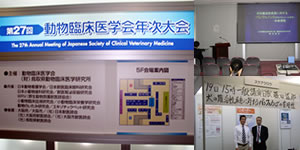
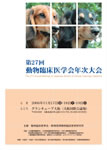
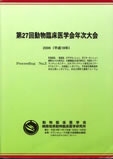
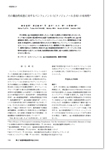

 We are proud that to date from among small and medium manufacturers, only the Scarecrow Corporation has made a presentation of clinical data on a supplement for two consecutive years; we feel this underlines the importance of our research.
We are proud that to date from among small and medium manufacturers, only the Scarecrow Corporation has made a presentation of clinical data on a supplement for two consecutive years; we feel this underlines the importance of our research.